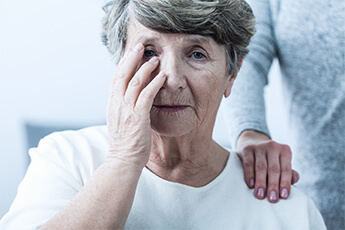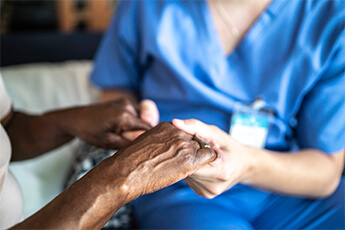How Is tardive dyskinesia treated?

Tardive dyskinesia (TD) is a side effect of certain medications that treat mental illnesses and other conditions. Not everyone who takes these medicines develops this movement disorder. But if you do, there are treatments that can help.

Who treats tardive dyskinesia?
Tardive dyskinesia is a movement disorder that causes involuntary facial tics like grimacing and lip-smacking. It can affect other parts of the body too.
Antipsychotic medicines (neuroleptics) that treat mental illnesses and antinausea (antiemetic) medicines that treat digestive problems can cause tardive dyskinesia. Most people who develop tardive dyskinesia take these medications for years before experiencing problems. Rarely, symptoms develop within weeks or months of starting a medicine.
Different healthcare professionals may be involved in helping you manage this medication side effect. These experts include:
gastroenterologists who prescribe antiemetic medicines to treat digestive problems
movement disorders neurologists who specialize in the diagnosis and treatment of movement disorders
psychiatrists who prescribe antipsychotics and other medicines to treat mental illness
psychologists who can help you cope with illness and tardive dyskinesia symptoms
From the community: “In my case, the psych is managing the meds since she is the one who started the course several years ago. I'm on the max dosage of the meds I'm taking, so increasing them (one of the options for controlling TD) is not do-able. So she is trying meds to alleviate the symptoms. At this point, I do not know if it will get worse or stay static. I can't stop taking the meds as I will not go back to the way things were pre medicine. My underling condition (severe OCD/debilitating anxiety attacks, ADD, severe depression) are too painful to bear. Even though the meds have only mildly improved my condition, I'll take the current state of my TD over going back to that. So I'm on board with the mediating drugs. FYI, I think I have only moderate TD (which is merely annoying). My TD symptoms include: uncontrollable tongue movements, pursing of my lips, lip licking, toes wriggling, rotating my middle finger around my thumb, tightening of my adductors, tensing up the muscles controlling my feet, eyebrow raising, and constant chewing motions. These movements never stop unless I'm sleeping. None of this is painful.” – Inspire member
Will tardive dyskinesia symptoms go away when I stop taking a medicine?
Tardive dyskinesia symptoms sometimes improve or go away completely when you discontinue a medicine or lower the dose — but you should only take these steps under your doctor’s guidance. Symptoms are more likely to resolve when there’s an early diagnosis.
Most people need daily medications to manage a mental illness or chronic condition. To ensure proper ongoing treatment of these conditions, your doctor may gradually lower the medication dose by 10% to 25% every 1 to 3 months. You may also switch to a different medicine that isn’t likely to cause tardive dyskinesia or worsen existing symptoms.
Occasionally, people get temporary symptom relief by increasing the medication dosage. Doctors don’t typically take this step because tardive dyskinesia symptoms eventually come back and are usually worse than before.
Unfortunately, stopping a medication doesn’t always get rid of symptoms. In rare instances, people develop tardive dyskinesia after they’ve already stopped a medicine. Some people find that going off a medicine increases involuntary tics and movements, or the problems continue without improvement. When symptoms persist after you make medication changes, your doctor will try other treatments.
From the community: “The first thing you need to know is NEVER stop your meds unless you've consulted the doc who prescribed them, especially after being on them for so long. There can be very serious side effects, one of the many can be an increase in TD symptoms. Please relax about the initial diagnosis of TD. Wait until you get confirmation from the neuro and psych. From what I've read, TD can be controlled and even reversed. Risperidone is one of the 2nd generation (or atypical) anti-psychotics that are supposed to be less likely to cause TD than the 1st gen (or typical) anti-psychs. … Prior to my official diagnosis in June, my psych started testing a bunch of drugs to alleviate the symptoms. She tried propranolol, intunive, diazepam and most recently amantadine. My neuro agreed that this was a valid choice of treatment. I've been on amantadine for a few months and noticed a decrease in TD symptoms at first, but the effect seems to be wearing off.” – Inspire member
What medications treat tardive dyskinesia?
Dopamine receptor-blocking medications cause tardive dyskinesia. To minimize the dyskinesia side effects of these drugs, your doctor may prescribe a dopamine-depleting medicine. These drugs include deutetrabenazine, tetrabenazine, and valbenazine.
These medications can reduce — but typically don’t eliminate — involuntary movements. They may cause a different set of side effects like:
daytime drowsiness
depression
insomnia
parkinsonism (tremors and muscle stiffness)
restlessness (akathisia)
What are the surgical treatments for tardive dyskinesia?
People with severe, disabling symptoms may undergo deep brain stimulation (DBS). A neurostimulator device sends electrical signals to the parts of the brain that control movement.
During this surgical procedure, your doctor:
places two electrodes (thin wires) into the brain
implants a small neurotransmitter device underneath the skin near the collarbone or chest area
threads a connecting wire under the skin to connect the neurotransmitter and electrodes
The device sends electrical signals through the connecting wire to the leads (thin wires) in the brain. Tiny electrical impulses (that you can’t feel) block signals to the brain that cause involuntary movements. DBS minimizes tardive dyskinesia symptoms.
What are other treatments for tardive dyskinesia?
You may benefit from other treatments for tardive dyskinesia, including:
botulinum toxin injections, which temporarily paralyze facial muscles
ginkgo biloba, an antioxidant (molecule) that fights compounds called free radicals that cause disease
Sources
Tardive dyskinesia. Baylor Medicine. 2018.
Deep brain stimulation. Dystonia Medical Research Foundation.
Drug-induced dyskinesias and dystonia: Tardive syndromes. Dystonia Medical Research Foundation.
Extract of Ginkgo biloba treatment for tardive dyskinesia in schizophrenia: A randomized, double-blind, placebo-controlled study. Journal of Clinical Psychiatry. May 2011.
Deep brain stimulation. MedlinePlus. January 2021.
Tardive dyskinesia. MedlinePlus. January 2021.
Tardive dyskinesia. Mental Health America.
Deep brain stimulation. Mount Sinai. September 2019.
Tardive dyskinesia. Mount Sinai. June 2020.
Tardive dyskinesia. National Alliance on Mental Illness. March 2019.
Tardive dyskinesia information page. National Institute on Neurological Disorders and Stroke. January 2021.
Tardive dyskinesia. National Organization for Rare Disorders. 2018.
Types of parkinsonisms. Parkinson’s Foundation. 2021
Tardive dyskinesia: A new treatment for an old disorder. Practical Neurology. June 2017.
Disclaimer
Member comments are lightly edited for length and to remove identifying information but are otherwise reproduced as they appear in the community as part of public posts.
This content is for general informational purposes only and does not necessarily reflect the views and opinions of any organization or individual. The content should not be used as a substitute for professional medical advice, diagnosis, or treatment. Please consult your healthcare provider about any questions you may have regarding a medical condition.




